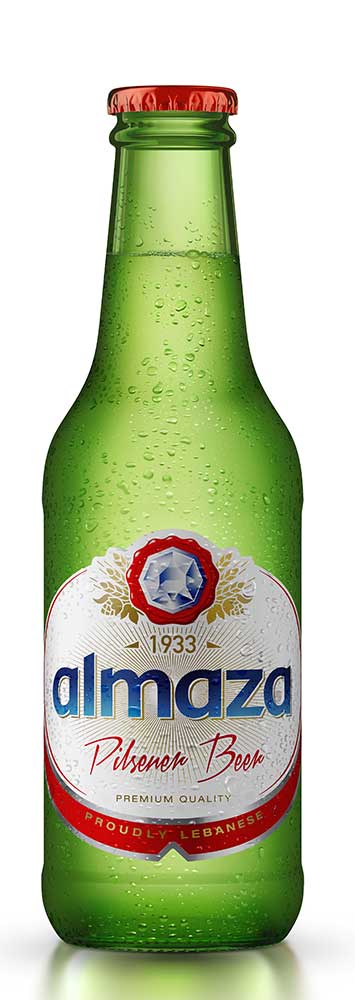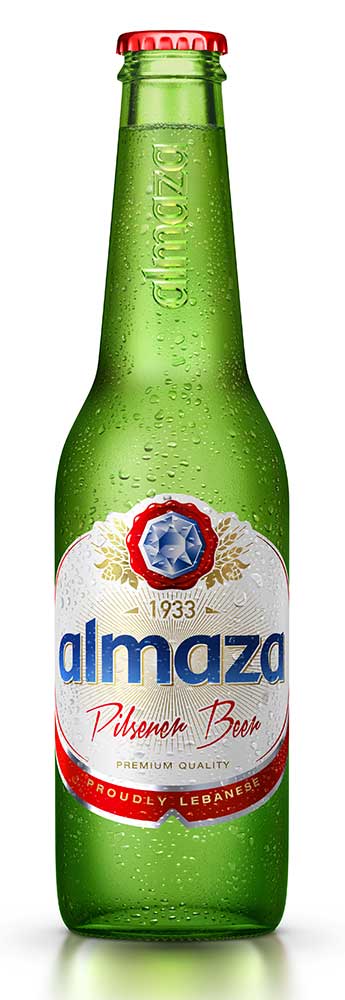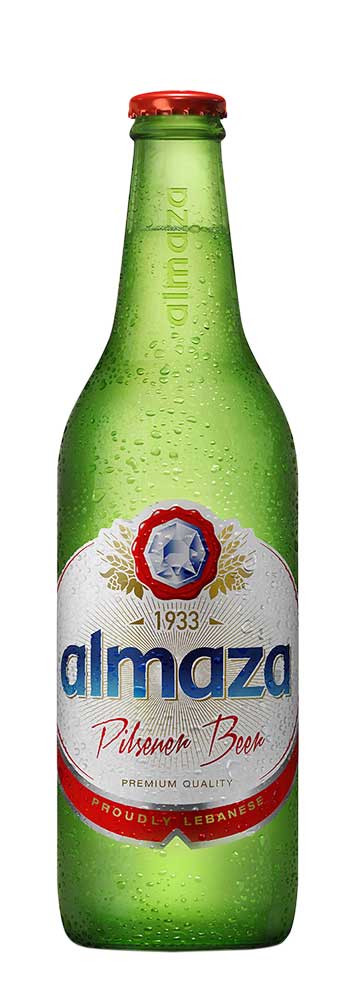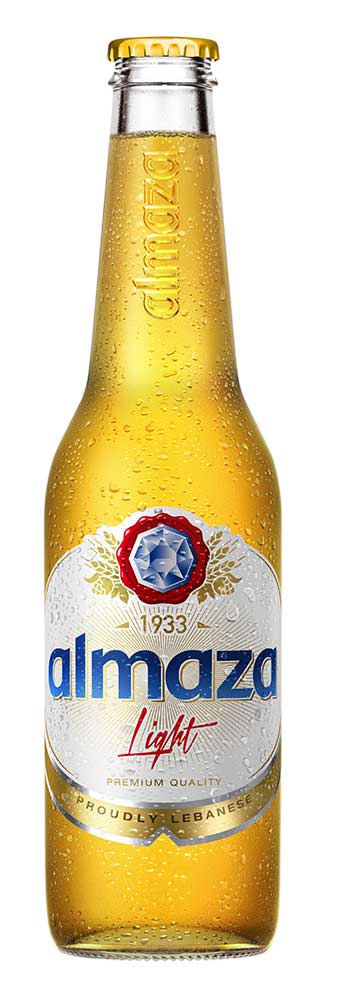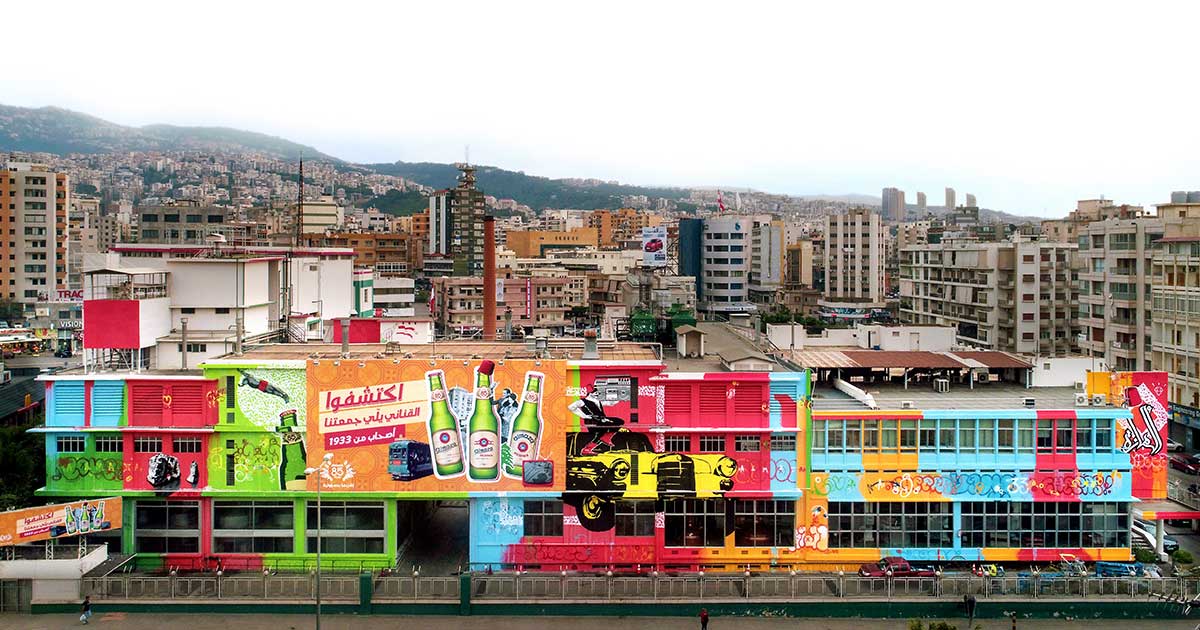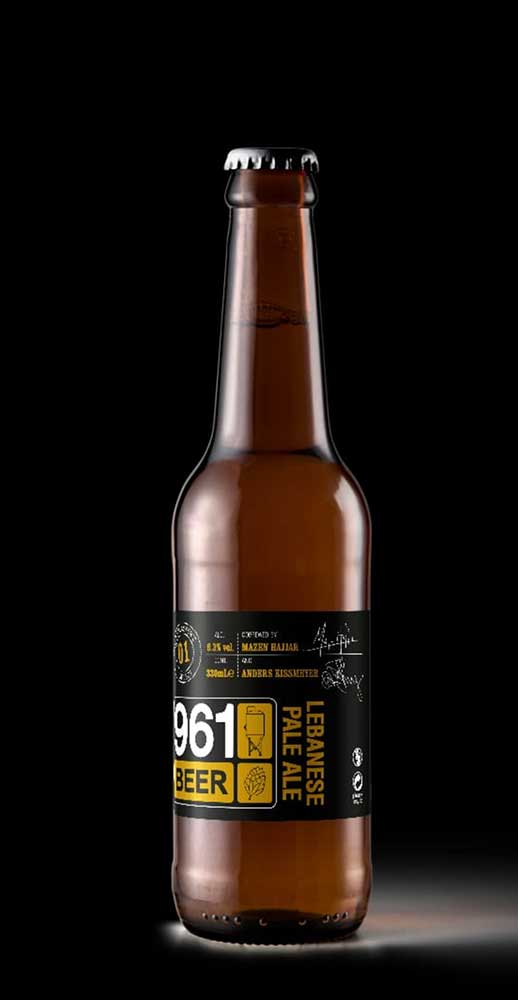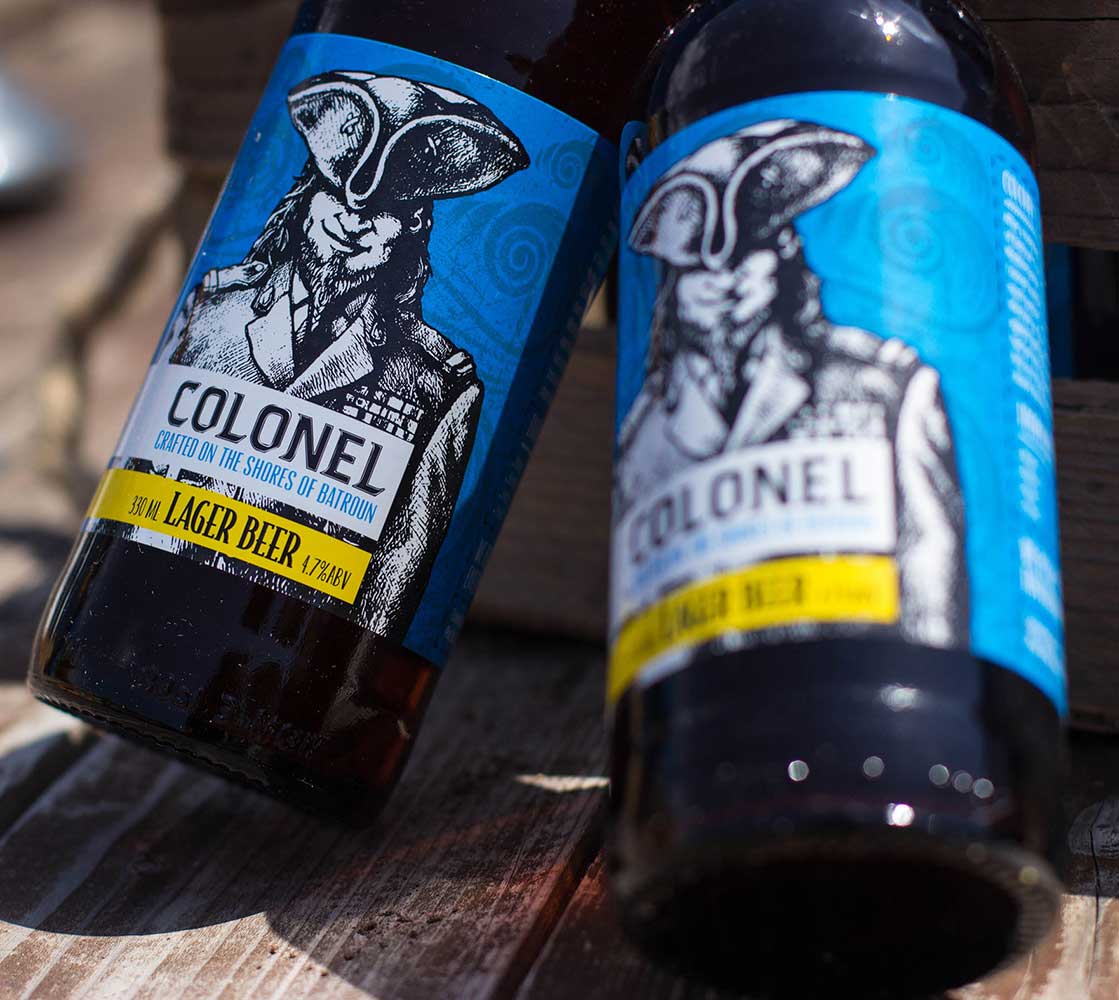Beer brewing is a craft that began more than 10,000 years ago, long before the discovery of wine. Today, it has become the highest-selling beverage throughout the world and Lebanese producers are emerging onto the scene with some innovatively crafty propositions



Paul Choueiry, is a name people in the alcoholic beverage industry know all too well. Having inherited the art of wine-making from his grandfather, Choueiry went on to study enology in Burgundy, France after which he earned the title of craft beer brewer from Berlin’s prestigious VLB. His company, Drunken Stork, has become the country’s go-to online platform to order some of the world’s best craft beers and spirits. Together with an equally impassioned individual, he is currently in the process of establishing his own bar.
Discussing this ‘intoxicating revolution’ that now sees Lebanon home to more than half a dozen locally crafted beer brands he said, “The emergence of craft beer constitutes not so much a step up from mass-produced beer, but rather leaps and bounds from what we grew up enjoying. With today’s tools, a knowledgeable brewer can prepare a fresh batch ready for consumption in three weeks.”
This kind of flexibility, which almost no other type of alcohol has, is in part down to the desire of today’s global consumers to enjoy a uniquely novel experience and beer which happens to be the perfect beverage capable of quenching their thirst. Furthermore, beer is made of water, hops, barley and yeast, which are available all year round. However, any change to these main ingredients, will result in a different tasting batch. Therefore, each recipe produces a unique kind of beer. “Furthermore, beer has a major advantage over wine, namely that if you happen to fall short on demand, you can always prepare more almost instantly. According to Choueiry, what has changed is that 30 years ago, Lebanese consumers only had one locally produced beer, which over time, saw most beer drinkers developing a strong emotional bond with the brand. “By the time air travel became much more affordable to most, a new gateway onto the world’s beers opened changing the way this beverage is consumed,” he said. “It felt like consumers now, having learned of other brands, quickly learned how diverse their own taste buds really are. As a result, settling for what has always been available no longer sufficed. In line with such diversity, these niche consumers, who are constantly growing, no longer settled for the traditional and instead opted for novelty whenever the opportunity afforded it,” Choueiry explained.
drunkenstork.com
Regressing back in time, Lebanon’s first beer maker, Almaza, which first opened its doors in 1933, had its majority shares acquired by the Heineken Group in 2002. This brought new talents, technologies and improvements to the local brewery. Since the introduction of the new ‘Almaza Special Dark’ (previously known as Pure Malt) and ‘Almaza Light’, the brewery hasn’t felt the need to expand any further into craft beers to counter the newcomers: A company representative said, “Almaza takes pride in being an internationally recognized and awarded beer. Surprisingly enough, Almaza did not feel a huge change in the market after the introduction of craft and artisanal beers. It relatively kept its leadership position in market share. The reason being that most of the new establishment were/are producing lagers, ales and others. Almaza on the other hand is a pilsner, which is lighter and most suitable for our country’s warm Mediterranean weather and local taste preference. The other types of beer are stronger and more suitable for colder weathers hence their bigger success in Europe.” In moving forward to ensure local and international growth, Almaza’s representative explained, “Locally, we are working on maintaining our reputation and relatability. Consumers are always exposed to new products and tastes but they will always favor premium beers for their quality and consistency. We are quite confident knowing that the Heineken group will continue to open new markets and opportunities for us to extend our reach.”
almaza.com.lb
Discussing the brand’s history since inception, the many ways the emergence of such a product has taken and what lies ahead, Kamal Fayad, managing partner of 961 beer said, “Throughout its journey, 961 managed to sustain its market position as the first, and leading craft beer, despite facing internal and external challenges imposed by economic and political factors. Over the years, the brand gained wide popularity on both the local and international scenes and acclaimed as a product of superior taste and quality. Our success is mainly attributed to the performance of a talented and dedicated team of individuals who strongly believe in the brand. This is something we can count on. Yet what truly makes me proud is the fact that the brand seemingly spearheaded the national craft beer movement and in turn inspired beer aficionados to take a chance in their own personal ventures. Our brand stands to exemplify the hidden potential and capability of the Lebanese individual as romanticizing and instigating as can be, to defy gravity almost and reset the status quo, to shine and prosper instead of simply remaining bottled up. We believe that the entry of new players into the market empowers our position further by driving the overall growth in demand for craft beers. In relation to moving forward, our strategy is geared toward increasing our sales potential in all markets. Currently, 961 exports to over 15 countries worldwide, continuously expanding its global reach. Locally we are interested in increasing our presence in as many outlets as possible and in so doing, take the brand to new heights.”
Despite the fact that it took the country’s second craft beer producer eight years to set up shop, what was about to ensue has since proven to be an entirely novel approach, the likes of which Lebanon had never seen. Jamil Haddad, founder of Colonel Beer is a man, who simply put, loves beer as much as he enjoys the great outdoors. A native of Batroun, he spent his days enjoying this coastal city’s breathtaking white sandy shores and unlike many, he never wanted to leave. Shedding light on that period in his life, Haddad said, “I began experimenting then producing my own beer at home, which later drove me to travel to London and enroll in a beer-making program. Another factor that strengthened my resolve to open shop here is that I have always wanted to make a life for myself in Lebanon and seeing how Batroun is my birthplace, the decision to return was clear and the location was ideal for what I had in mind.” Following many years of research, experimentation and lots of tinkering, he managed to rally a tremendous following for his cause and even got Batroun’s Municipality to rent him a piece of land right by the sea. The reasoning behind that decision was based on the notion that creating a local product would, ideally speaking, put that area on the map and in turn transform this place into an all year-round, go-to destination. In 2014, that is exactly what happened when Colonel Beer launched. The remarkable element about that young brand, which today has become a sort of Lebanese staple, is that it created a platform for like-minded individuals who share an affinity for nature and good beer. Elaborating Haddad said, “We entered the market with confidence knowing that the global wave for craft beer has been growing tremendously well signaling the increased need for such an offering. However, the products we offer are in no way competing with any of the existing brands. The Colonel brand is based on a far more inclusive F&B concept that pairs beer with food, thus the restaurant. With the availability of technology, anyone who can afford to purchase beer- brewing equipment can easily do so, yet building an entire concept around a brand is an entirely different proposition. In other words, we have managed to create a shared communal experience centered on a brand, which year on year, has been growing by about 15 percent.”
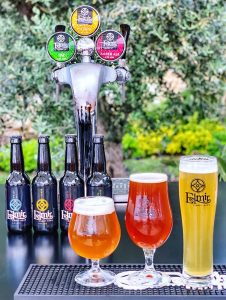 While Haddad launched the brand out of love for the beverage and the craft, another more recent brand emerged, yet this particular one was based on a dare, a love for the sciences and family. “It’s the story of two cousins taking a brewing course together in London back in 2015. Noël Abi Nader was already a home brewer and I was pursuing a Master’s degree in Green Chemistry at Imperial College. We decided to take brewing to a professional level and Elmir Brewing Company was set up beginning 2018. The main driver, besides passion, was the challenge to establish a successful microbrewery in a highly competitive market,” remarked Elmir’s Brew Master Chris Fadel. Ironically, while the brand is still in its infancy, the real challenge thus far has been sourcing premium ingredients from across the world and guaranteeing their quality throughout transport and storage, which Fadel explained is where Elmir’s quality assurance and control program comes into play. Keep in mind that all ingredients are natural with no additives included in the final product. The other matter that is currently under consideration, is what kinds of styles to develop and which to include in the offering. “The Lebanese beer market is slowly evolving and people’s taste palette is also widening as they become more familiar with a wider array of beers, be they imported craft beers or local craft beers. The market is still young and there are several areas that are untapped, which makes the adventure all the more interesting for us. Nonetheless, and to our surprise, our India Pale Ale is number one in terms of sales, followed by the Pilsner. It is significant since it means the Lebanese audience is getting ready for craft beers and, depending on the setting and mood, they choose to drink different styles!
While Haddad launched the brand out of love for the beverage and the craft, another more recent brand emerged, yet this particular one was based on a dare, a love for the sciences and family. “It’s the story of two cousins taking a brewing course together in London back in 2015. Noël Abi Nader was already a home brewer and I was pursuing a Master’s degree in Green Chemistry at Imperial College. We decided to take brewing to a professional level and Elmir Brewing Company was set up beginning 2018. The main driver, besides passion, was the challenge to establish a successful microbrewery in a highly competitive market,” remarked Elmir’s Brew Master Chris Fadel. Ironically, while the brand is still in its infancy, the real challenge thus far has been sourcing premium ingredients from across the world and guaranteeing their quality throughout transport and storage, which Fadel explained is where Elmir’s quality assurance and control program comes into play. Keep in mind that all ingredients are natural with no additives included in the final product. The other matter that is currently under consideration, is what kinds of styles to develop and which to include in the offering. “The Lebanese beer market is slowly evolving and people’s taste palette is also widening as they become more familiar with a wider array of beers, be they imported craft beers or local craft beers. The market is still young and there are several areas that are untapped, which makes the adventure all the more interesting for us. Nonetheless, and to our surprise, our India Pale Ale is number one in terms of sales, followed by the Pilsner. It is significant since it means the Lebanese audience is getting ready for craft beers and, depending on the setting and mood, they choose to drink different styles!
Another brand synonymous with Lebanon, is Kassatly Chtaura, established in 1974 by President and CEO Akram Kassatly. Armed with a degree in winemaking from Dijon, France, Kassatly dreamed of following in his father’s footsteps and creating a legacy of his own in winemaking, which he did in 2005. This was soon followed by a whole range of other concentrated syrups, liqueurs, a ready-to-drink vodka beverage and a non-alcoholic carbonated fruit beverage. But that was not enough for Nayef Kassatly, the founder’s grandson and company VP. After extensive research he, alongside his two sisters, Reem and Ghida who work at the company, introduced in 2014 Lebanon’s second mass-produced beer brand brewed to Pilsner’s strict and authentic purity laws called Beirut Beer. The project had been their father’s dream since the age of 14.
When asked to explain his decision to enter the local beer market, given the competition, he said, “Lebanon’s beer market is not small, rather under-evaluated. Since we have a strong presence in the alcoholic and beverage industry, expanding our offering to include beer felt like a natural progression to our almost 100-year-old brand. We also felt that the local offering was not being as innovative as it could, which further motivated us to do something different. This was literally our chance to enter.”
The visibly tangible innovations introduced hit the mark in an exceptionally effective way affirming his vision of what local consumers have been craving. The Chtaura brewery and bottling hall, cost a combined USD 25 million to build, is fitted out with top of the line German brewing machines and can produce 20 million liters of beer annually, which come in four different sizes.
Elaborating on the strategy, he said, “After extensive research, we arrived at the conclusion that offering consumers a smaller beer bottle would be quite a suitable idea especially since Lebanese people like to enjoy their beer as cold as possible. Also, we felt that offering consumers numerous choices would further strengthen our proposition. As a result, we crafted the 500, 330 and 250 ml, and even went as far as creating the 150 ml bottle. Furthermore, we concluded that the Japanese ring-pull bottle cap, though six times more expensive, is the best way to go. It affords consumers the ability to enjoy our product anywhere, hassle-free, which makes for a smoother and more enjoyable beer-drinking experience. Though this significantly raised overhead, it on the other hand allowed us to sell more. Another invisible innovation to which we lent plenty of thought, is price point. In this context, we arrived at the conclusion that Lebanese, in general, dislike carrying coins. So, to further ensure a simple transaction when purchasing our beer, we set the price point of the variously-sized bottled as round figures, thereby doing away with the hassle of scurrying for change. While one may argue about the validity such factors have on the experience, we found that it truly does affect the choice of brand consumers make when they think of beer. This is clearly evidenced by the company’s gain of almost half of all bottles sold in Lebanon.”
He added that despite the fact that 961 was the first local brand to launch Lebanon’s craft beer industry, the market had not been ready, which is understandable as that wave only began to take form some five years ago in Europe. “That inflection point may have been because consumers had gotten weary of mass-produced beer offering little if any distinct character,” he explained. “Craft beer producers only use premium ingredients as opposed to mass produced beer. This is because hops are the most important and expensive ingredients in beer making. This explains why in general, craft beer is more expensive as brands have a limited production capacity and higher running costs so the amount sold is much lower. In our current market, mass-produced beer constitutes roughly 85-90 percent of the Lebanese market. However, the sense consumers have for novelty is significantly growing and has almost doubled in the last five years when it comes to craft beer, which signals that there is a longing for discovery of this kind.”



